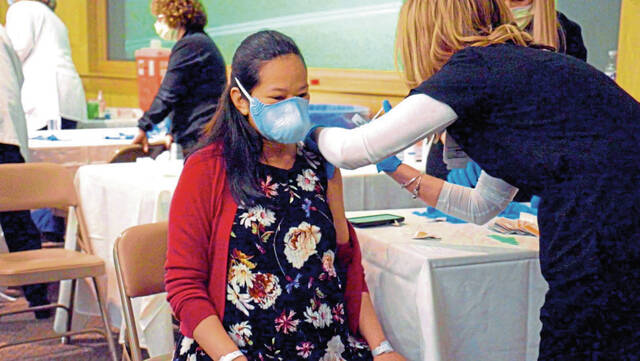Pregnant women are considered to be at high risk of severe covid-19 infection, sparking the Centers for Disease Control and Prevention to again urge them to be vaccinated.
They also are eligible for a booster dose of the Pfizer vaccine, if they had received the Pfizer inoculation initially.
“Although the overall risk of severe illness is low, pregnant people and recently pregnant people are at an increased risk for severe illness from covid-19 when compared to non-pregnant people,” the CDC wrote in a message.
“The main reason they’re at higher risk is because pregnant women are one of the least-vaccinated groups in the country,” said Dr. Michael Aziz, a maternal fetal medicine physician with Allegheny Health Network.
Simply being pregnant also puts them at a higher risk of infection, he said, as “pregnancy is an immunocompromised state.”
In general, pregnant women tend to have more severe outcomes from viruses such as covid-19, said Dr. Hyagriv Simhan, director of the Division of Maternal-Fetal Medicine and medical director of obstetrical services at UPMC Magee-Womens Hospital.
“If a pregnant woman gets covid, she is much more likely than a medically equivalent person who is not pregnant to get severe illness from covid,” he said.
Pregnant women, he explained, have greater oxygen and blood-flow needs to support their pregnancy — and both oxygen and blood-flow are “stressed” by infections such as covid-19.
As pregnancy progresses, the uterus begins pushing up against the lungs, making it harder for them to expand, Aziz said. Therefore, any respiratory illness in pregnancy can be worse.
“Unfortunately, so far at least 161 pregnant women have died in the United States of covid infection,” Aziz said. “In August alone, 22 pregnant women died. So it’s really a public health crisis to get pregnant people vaccinated as quickly as possible.”
Aziz and Simhan agree pregnant women should be vaccinated against the virus, although vaccination rates in that group remain low.
As of Sept. 18, 31% of pregnant women were vaccinated against covid-19, Aziz said, despite assurances from the medical community that the vaccines are safe for pregnant women and their babies.
“As with any medical intervention, we always weigh risks and benefits,” he said. “Because there is a known benefit of being vaccinated and there is no known negative impact for a pregnant person or their baby, we strongly recommend vaccination.”
Because pregnant women are at higher risk of severe infection, they also are eligible for a booster dose if they received the Pfizer inoculation. Simhan said he’s urging his patients to get the booster if they had their initial vaccine regimen at least six months prior, as they are at higher risk of severe infection — even if they’re otherwise healthy.
“These are, generally speaking, otherwise healthy young people who don’t think of themselves as sick,” he said. “I could understand not having that self-perception of vulnerability. But that’s not the case.”
Women can be inoculated against covid-19 at any point during their pregnancy, he said.
The vaccine not only protects the mother from covid-19, but it also can confer antibodies to the fetus in a process referred to as “cocooning,” Simhan said, explaining that this is done with other vaccines as well.
“Antibodies that women produce in response to vaccination can cross the placenta and give antibodies to the baby so that, when the baby is born, the baby has antibodies to an infection it has not otherwise been exposed to,” he said.
Simhan and Aziz said they believe the reason vaccination rates among pregnant women remain low is because of misinformation. They emphasized that the vaccines are safe and do not impact fertility or lead to higher instances of adverse pregnancy reactions such as miscarriage.
For pregnant women who contract the virus, Simhan suggested they reach out to their doctors about potential treatments such as monoclonal antibodies.
He also urged pregnant women to continue seeking prenatal care and being treated in health care facilities despite the pandemic.








